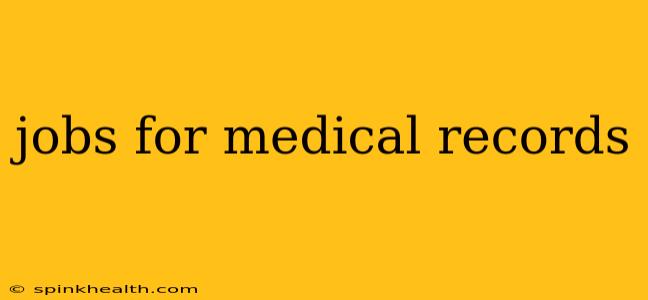The world of healthcare is vast and complex, but behind every diagnosis, treatment plan, and successful surgery lies a crucial element: accurate and readily accessible medical records. This intricate system requires skilled professionals to manage, organize, and protect sensitive patient information. If you're detail-oriented, organized, and passionate about healthcare, a career in medical records might be the perfect fit. This isn't just about filing papers; it's about safeguarding patient well-being and ensuring the smooth functioning of the entire healthcare system. Let's delve into the diverse landscape of jobs in medical records.
What are the different types of medical records jobs?
This is a question frequently asked by those exploring this career path. The field offers a surprising variety of roles, each demanding a unique skillset and level of expertise. Let's explore some key positions:
1. Medical Records Technician:
This is often the entry-level position, providing a fantastic stepping stone into the field. Imagine Sarah, a recent graduate with an associate's degree. She landed a job as a medical records technician at a bustling city hospital. Her days are filled with organizing charts, scanning documents, and ensuring the accuracy of patient data. She’s learning the ropes, honing her skills, and discovering her niche within the department. This role is essential for maintaining the integrity and accessibility of patient records, setting the stage for smoother workflows across the entire healthcare facility.
2. Registered Health Information Technician (RHIT):
To advance her career, Sarah decided to pursue her RHIT certification. This nationally recognized credential demonstrates competence and expertise in the field. The RHIT certification opens doors to greater responsibility and higher earning potential. Now, Sarah is involved in more complex tasks like analyzing data for quality improvement initiatives, ensuring compliance with HIPAA regulations, and contributing to the hospital's overall efficiency. She's become an invaluable asset to the team.
3. Registered Health Information Administrator (RHIA):
At the top of the career ladder, we find the RHIA. Think of it as the conductor of an orchestra – coordinating, overseeing, and managing the entire medical records department. This role often involves strategic planning, overseeing staff, budget management, and ensuring compliance with ever-changing regulations. With her RHIA certification, Sarah could eventually lead a team, shaping the department's direction and impacting the overall quality of patient care.
4. Health Information Management Specialist:
This role is multifaceted, encompassing many of the responsibilities mentioned above, but also focusing on the technological aspects of managing medical information. This includes working with Electronic Health Records (EHR) systems, ensuring data security and integrity, and implementing new technologies to improve workflow efficiency.
What skills are needed for a medical records job?
Beyond the formal qualifications, certain soft skills are critical for success in this field:
- Accuracy and Attention to Detail: Medical records contain sensitive information; even a small error can have serious consequences.
- Organizational Skills: Managing large volumes of data requires impeccable organizational skills.
- Problem-solving Skills: Identifying and resolving discrepancies or inconsistencies is a daily task.
- Computer Skills: Proficiency in various software applications, including EHR systems, is essential.
- Confidentiality: Maintaining patient privacy is paramount and requires a strong ethical compass.
What is the job outlook for medical records jobs?
The demand for skilled professionals in medical records is consistently high. The aging population, the expansion of healthcare systems, and the increasing reliance on electronic health records all contribute to a robust job market. This is a career with significant growth potential and opportunities for advancement.
What is the salary range for medical records jobs?
Salaries vary depending on experience, education, location, and employer. Entry-level positions typically offer a competitive starting salary, with significant increases possible with further education and experience. This makes it a rewarding career path both in terms of personal fulfillment and financial stability.
How can I get a medical records job?
Securing a job in medical records typically involves obtaining an associate's or bachelor's degree in health information management, followed by relevant certifications like RHIT or RHIA. Networking, internships, and building a strong resume are also crucial steps in the job search process.
This journey into the world of medical records reveals a career path rich in opportunity, offering a blend of intellectual stimulation, technological engagement, and the profound satisfaction of contributing to the overall health and well-being of others. It’s more than just a job; it’s a career dedicated to the meticulous and crucial task of safeguarding patient information and ensuring the seamless operation of our healthcare system.

